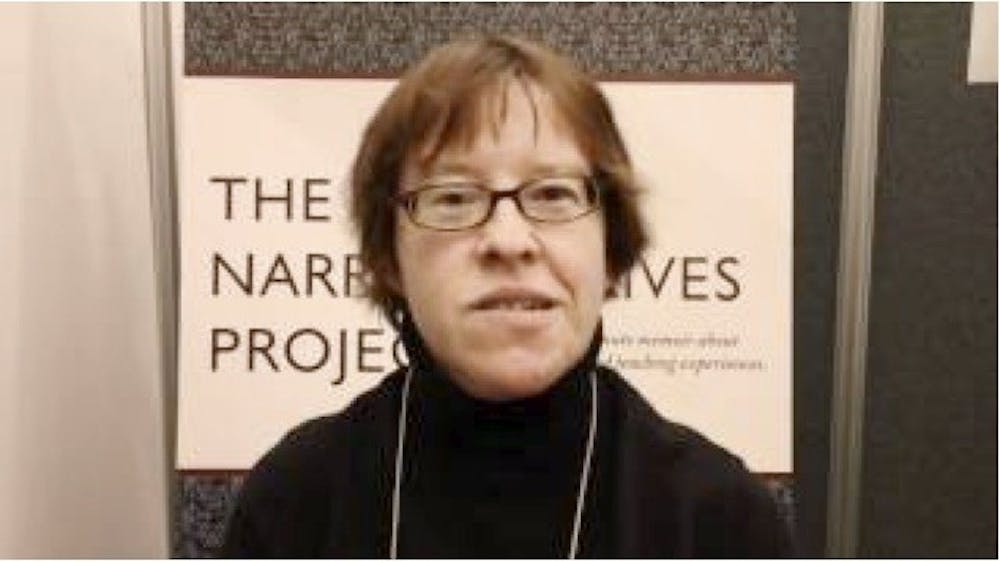If you are reading this article, you should stop. Take a moment to look around you. Actually, look at all the people around you. Are they tall or short? Do they have long or short hair? Who exactly is everyone not on the outside, but on the inside?
Often we find ourselves “judging a book by its cover.” This unfortunate conscious act is done every day by you and me.
On Sept. 13, at Old Main Chapel, more than 100 SU students and staff came to listen to Ann Keefer. Her presentation was titled “Fabulously Disabled Since 1970: Or, How I Learned to Stop Worrying and Love My Impairments.”
Keefer suffers from VACTERL Association, which is an association of birth defects that can effect newborns’ bones, spines and organs.
Keefer walked on stage with her beautiful blue scarf wrapped neatly around her neck, to help make her nerves go away as she claimed and she had a smile that stretched from ear to ear.
As students were getting ready to briskly jot down notes for extra credit Keefer adjusted the microphone and began her presentation.
She began by explaining who she is and why she is here. Like any good speaker, Keefer told the audience she wanted the lecture to be fun and give it a sense of her experience with having a disability.
Most importantly, Keefer wanted to erase any stereotypes of people with disabilities.
She was charismatic and confident with every sentence she spoke.
Keefer was a shy child, but what is amazing is that her parents did not try to hide her disability at all. They spoiled their daughter with picture after picture. Always making it known that, yes, Keefer is different, but it is a great kind of different.
The doctors told Keefer’s parents not to get attached to their child because she may not live. However, the nurses were outstanding. They were very supportive and nurturing.
As Keefer stood in front of the audience with grace, it is crazy to think that she did not crawl or walk for a long time.
Everyone giggles as Keefer describes doing things as a child with her feet, such as petting the dog.
As Keefer grew into a young lady, her mother thought it would be best to attend an alternative junior high, which benefited her tremendously. This is where Keefer’s life began to change. She embraced her “freakishness.”
A teacher told her he picked her specifically to be in his homeroom because he found Keefer to be interesting. For the first time she realized that her impairment was not what she thought.
Keefer still struggled with things, but she strived through her adversity. When she was in her undergraduate years, she was finally able to stand up and say, “Hey! My name’s Ann Keefer and I have VACTERL Association, and it is pretty good.”
Over these years of achieving her undergraduate degree, Keefer was inspired by many people who are very dear to her heart to this day. These teachers pushed her to pursue what she loved despite her disability. Keefer did not care if there were no jobs in the field she wanted to study;- this is what she wanted to do more than anything.
As Keefer wrapped up her lecture, she proposed a very powerful question, one in which she asks herself every day. “Live through my disability, or do I live through (experience, embrace, invest) my disability?”
She described how each day is different, and she never knows how she will live through her disability. It is a surprise, in a way. Keefer smiles as she ends with a quote from RuPaul, “Work it girl!”
She certainly did work it. After the presentation Keefer talked about giving advice to those with disabilities.
“It gets better,” Keefer said.
She had this sparkle in her eye as she described that one does not have to live ones life in despair if one has a disability.
She explained what got her through her disability, and she said it was support from loved ones. It was family and friends who supported Keefer to be the educated and successful woman that she is. It was especially helpful to find others who had disabilities as well. A positive attitude and support goes a long, long way.
Keefer stressed that people with disabilities are just like everyone else. They do not need to inspire every person they meet.
People with disabilities are important just like people without, which makes this unnoticed issue apparent.
What are we doing to expand research on disabilities? What are we doing to help those who have disabilities? So, what are you going to do now? Will you stand by or will you stand up? Give a voice to the unheard. Let it be known that everyone is fabulous.
Allison Carey, department of sociology and anthropology and Christine Senecal, department of history planned the event. Hopefully, after Keefer’s speech, SU will be inspired to think differently about the disabled.



The Slate welcomes thoughtful discussion on all of our stories, but please keep comments civil and on-topic. Read our full guidelines here.